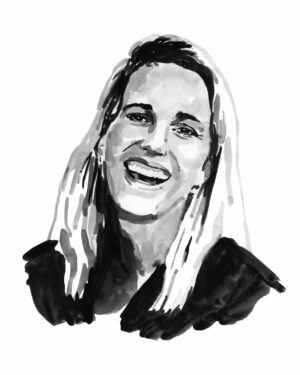Ocean Storytelling Film Grant
Our oceans need to be top priority if we are to secure our future. They need to be foremost in our minds and present in our hearts if we want to create meaningful change. At the Save Our Seas Foundation (SOSF), we believe that storytellers have a powerful and unique role to play in making this happen. While we have a strong history of supporting marine conservation and education projects, it is through compelling stories that the message behind the scientific facts and figures can take root in our hearts. And it is by stirring emotions in us that stories can foment ideas and action, the key to inspiring us all to play our part in creating a better world.
We are delighted to introduce our Ocean Storytelling Grant – Filmmaking as the latest development in our continued drive to support a new generation of ocean storytellers who can convey conservation crises with precision and empathy, and kindle the kind of wonder that nudges us all closer to the sea.
The Filmmaking Grant represents a new category in our Ocean Storytelling Grants, which include the Photography and Writing Grants and are overseen by the SOSF’s director of storytelling and National Geographic photographer Thomas Peschak. The filmmaking category introduces a suite of new mentors who bring their vision to conservation storytelling. The inaugural filmmaking year will be run in collaboration with Oscar-winning director Pippa Ehrlich, the director of programmes at the BBC’s Natural History Unit Sreya Biswas and award-winning cinematographer Daniel Beecham.
This filmmaking category builds on the legacy of our previous photography and writing grants and is dedicated to supporting a diverse generation of emerging conservation storytellers. While we don’t expect that all applicants will be filmmakers with a marine focus, we are specifically looking for storytellers who can tell conservation stories about our oceans. Whether it be about the animals themselves, or fisheries or the communities whose lives are intertwined with marine life, a filmmaker’s story can inform, transport, enchant, endear and persuade. Successful grantees will receive a US$50,000 budget to cover a conservation story under direct mentorship from the Storytelling Grant team. We are particularly seeking to support early-career and emerging storytellers and aim to encourage new voices with fresh perspectives and filmmaking approaches. As such, while applicants must already be committed to filmmaking, they should have no more than five years of professional experience in any film-related discipline. We encourage women and applicants from underrepresented communities to apply for this opportunity. Applications will be accepted both directly via open call and through nomination.
Find out more about the entry requirements here.
Photo © James Lea
PRIZES
- One winner will be selected for each grant.
- Each winner will receive a US$2,000 cash prize and will be given a US$50,000 budget to complete their film.
- The grantees will be mentored by Pippa Ehrlich (Oscar-winning director of My Octopus Teacher), Sreya Biswas (director of programmes at the BBC Natural History Unit) and Daniel Beecham (cinematographer on projects like Blue Planet II). Thomas Peschak (SOSF director of storytelling), Dr James Lea (CEO of SOSF) and Jade Schultz (global communications manager at SOSF) join the panel as judges.
- All winners will be given the chance to showcase their marine conservation story assignment.
APPLICATION PROCESS
- The Ocean Storytelling Grant – Filmmaking application process consists of a two-stage online application. The first stage consists of a few questions and requires submission of three short videos (max. 3 minutes each): an introsudtion to yourself, a sizzle reel and a pitch.
- Only one application will be accepted per applicant or team. A team can be of any size, as long as the applicants can manage it within their budget.
- If an applicant has any other current SOSF grant, they cannot apply for a new grant.
- All applications will be reviewed by the Ocean Storytelling Grant – Filmmaking judging panel and require final approval from the foundation’s board of directors.
- If successful, the SOSF Grant agreement between the foundation and the applicant must be sent back by the deadline. This agreement cannot be modified.
Photo © Byron Dilkes
Meet the judges
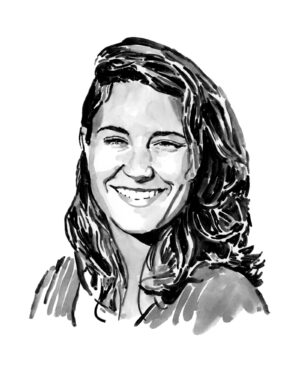
Pippa Ehrlich
Pippa is an Oscar- and BAFTA-winning filmmaker and journalist whose work brings powerful conservation stories to a global audience. She co-directed the acclaimed feature My Octopus Teacher, a film that transformed perspectives on the human connection to nature.
Pippa has since directed My Mercury and Pangolin: Kulu’s Journey, which were released on Netflix in 2025. Her work has won more than 20 international awards, including the Wildscreen Golden Panda and Jackson Wild’s Grand Teton, placing her among the leading voices in environmental storytelling.
Pippa’s storytelling seamlessly blends scientific depth with emotional intimacy, making urgent conservation issues accessible to a worldwide audience.
Dan Beecham
Dan has been an underwater cinematographer for more than 20 years. He started his career with the Save Our Seas Foundation and in recent years has worked on many highly successful wildlife shows, including Blue Planet II, Planet Earth III and Underdogs.
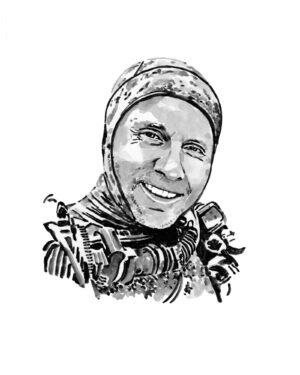
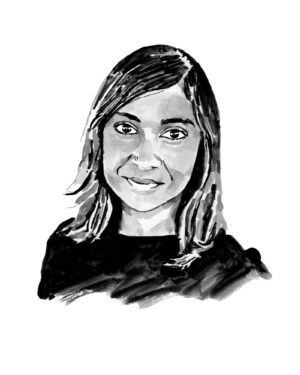
Sreya Biswas
Sreya is the director of programmes at BBC Studios Natural History Unit, where she oversees a number of key projects. She also leads development and digital initiatives for the NHU and is developing a forward-looking portfolio of innovative programmes and content for global clients across various platforms.
Before the Natural History Unit, as the BBC’s head of commissioning for natural history Sreya oversaw several major landmark series, including Asia, Kingdom, Planet Earth III and Blue Planet III, as well as a broad range of natural history content such as Big Cats 24/7, Hamza’s Hidden Wild Isles and An Hour on Earth. Her feature documentaries include the multi-award-winning Silverback and Orphan and the environmental thriller On Thin Ice: Putin v Greenpeace.
Before commissioning, Sreya was an executive producer at Naked Television. While living and working in the USA, she oversaw and self-shot the Emmy Award-winning television series The Day I Picked My Parents for the A&E network.
Thomas Peschak
Thomas Peschak is a National Geographic Explorer and photographer specialising in documenting the beauty and fragility of the world’s oceans, coasts and wild places. Trained as a marine biologist, he embraced photojournalism after realising his photographs could have a greater conservation impact than scientific statistics. Peschak has covered some of the most critical conservation narratives of our time, and his stories have been featured in 20 National Geographic magazine editions. His recent magazine work includes ‘The Amazon’s First Storytellers‘ (June 2023) and ‘Niassa: The Myth of Wild Africa‘ (Sept. 2023).
His images and stories have won 18 Wildlife Photographer of the Year awards and seven World Press Photo Awards. He was also recently awarded National Geographic’s Eliza Scidmore Award for Outstanding Storytelling. Peschak is a founding director of the Manta Trust, the Director of Storytelling for the Save Our Seas Foundation, and a senior fellow of the International League of Conservation Photographers.
As part of the National Geographic and Rolex Perpetual Planet Amazon Expedition, Peschak completed a 396-day-long exploration of the Amazon River Basin, documenting its wonders and challenges from underwater and topside perspectives. Starting with ice axes and crampons in the icy high Andes and finishing with scuba gear in the Atlantic Ocean, he created the first-of-its-kind comprehensive photographic archive of our planet’s most iconic and biodiverse river system. This body of work was published in October 2024, making Peschak only the second person in the Society’s 137-year history to photograph an entire magazine issue.
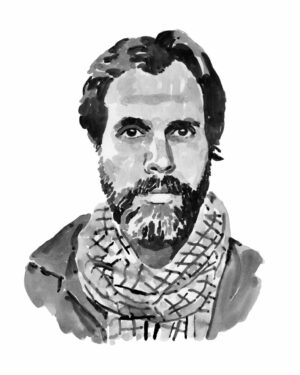
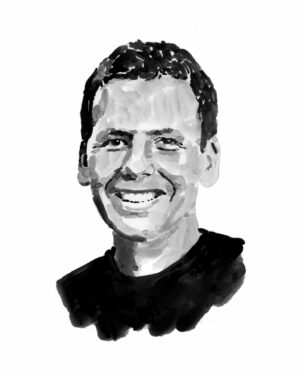
James Lea
James is a shark biologist and the chief executive officer of the SOSF. Although his love for the ocean realm has taken his own career down a path of scientific research, this passion was inspired, and is maintained, by a deep affection for stories. These stories have taken different forms (like his grandfather’s tales of blue and porbeagle sharks) and been conveyed through different media (like the entrancing productions of Cousteau and Attenborough, and the adventures of photographers, including our own Thomas Peschak, heard in underwater camera stores) – but they have all had a strong influence on him. Indeed, James recognises the unique power that stories have to affect people’s world view. He is particularly excited to support emerging writers who want to connect audiences with critical conservation issues through engaging storytelling – and in turn inspiring us all to be part of the solution and make a difference.
Jade Schultz
For more than a decade, Jade has been working with natural history stories to engage audiences, raise awareness and highlight conservation issues. As content manager for the SOSF, she oversees the communication interface between the foundation and its audience and has witnessed at first hand how accurate and engaging writing can communicate sound science. Often the ‘middleman’ between scientists and their audience, Jade has learnt how to identify the hallmarks of an engaging story and how to coax what is relatable, pertinent and meaningful out of the facts and figures.
In an age when people are bombarded with information and seem to only scan a page or timeline rather than really read, capturing an audience and holding its attention with the right story length, level of detail and language have become an essential part of how Jade guides scientists to tell their stories. She is passionate about conservation and effective communication, as well as exploring the various media available to inspire others and hopefully drive conservation change.
